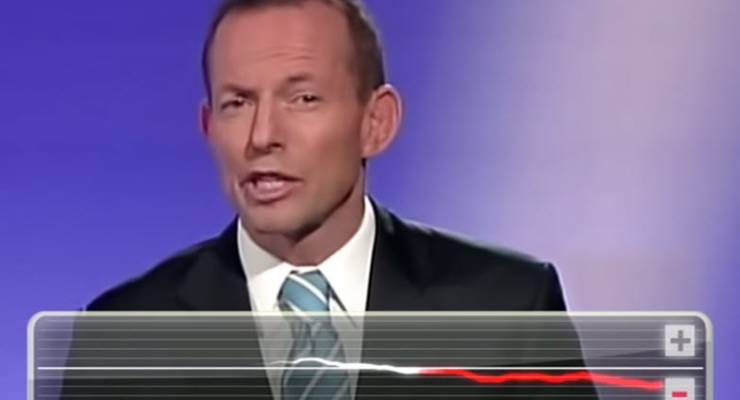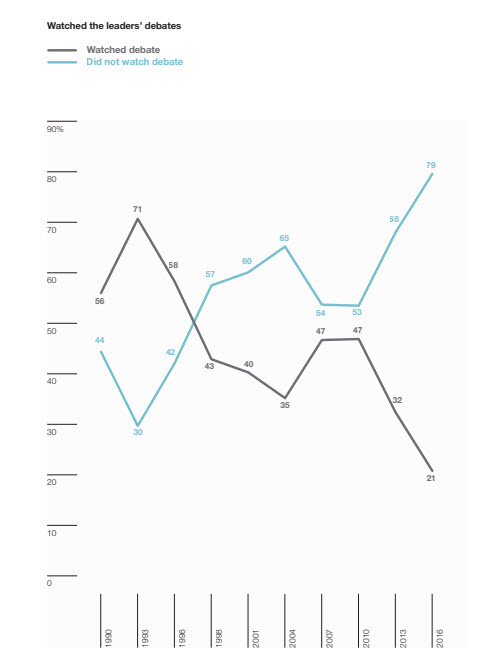
Tonight Scott Morrison and Bill Shorten will face off in the first television leaders’ debate of the election campaign. But don’t expect huge ratings or any big, vote-swinging zingers. Instead, tonight’s edition — shunted onto Seven’s second channel — will likely show just how far debates have fallen in importance to the election campaign.
Dwindling ratings
Once upon a time, leaders’ debates were prime-time ratings gold. In 2001, the debate between John Howard and Kim Beazley was watched by 2.44 million, while 2007’s showdown between Howard and Rudd was watched by 2.4 million. The 2010 debate between Julia Gillard and Tony Abbott was pushed out of its 7.30pm timeslot to avoid clashing with the finale of MasterChef, but still attracted around 3 million viewers across numerous networks. For context, that year’s AFL Grand Final was watched by 3.6 million.
Then the decline kicked in. In 2013 Nine — for whom election debates had previously been a ratings bonanza –shifted Rudd v Abbott to its second channel Gem. The debate drew 1.5 million viewers across seven channels — 1 million viewers less than various reality shows TV stations which ran on the same night.
By 2016, the irrelevance of debates was on full display. The first debate was held on a Friday night, locked behind the Sky News paywall. It drew just 54,000 viewers (something of a ratings hit for Sky’s after dark content). The second debate returned to the ABC and drew 875,000 viewers, but that number quickly fell within three minutes of the relatively pedestrian affair kicking off.
Did voters stop caring?
Not only are debates less watched, surveys suggest they’re less important to voters. Since 1990, the Australian Electoral Study has tracked whether people watched the leadership debate. Interest peaked in 1993, when 71% of respondents said they tuned in (that debate was between Paul Keating and John Hewson; the Liberal leader led his party to defeat in the “unloseable” election). By 2016, that figure had plummeted to 21%.

This decline could be in part due to changes in the way we engage with politics. Social media gives voters unfettered access to politicians, and a constant opportunity to make their views heard. When punters can go off at politicians online at any time and watch their gaffes and candid moments via livestream, a leaders’ debate seems more and more like a series of scripted soundbites.
The fate of the Worm is something of a case study in changing voter engagement. First introduced in the 1990s, the little line which wriggled across the bottom of television screens to gauge the reaction of swinging voters was once a staple of election season.
The Worm was unpopular among politicians — so much so that in 2007, the Coalition refused to let Nine use it during the Howard-Rudd debate. When the network used it anyway, the National Press Club controversially cut their broadcast twice. This led then-Greens leader Bob Brown to call for a Senate inquiry.
But by 2016, the Worm was gone. Instead, discussion had moved online to Facebook and Twitter. Even the debates themselves were being live-streamed via social media platforms. Platforms like Facebook also give viewers the opportunity to react to live content, creating an online version of the Worm.
The decline of the debate might be a reflection of the decline of TV itself. But in other countries, debates still seem to matter. In the United States, presidential debates are still something of a political Super Bowl; in 2016 they drew in more than 80 million television viewers (not including the many more who streamed online) and inspired a constant stream of memes. Before the 2015 general election in the United Kingdom, a survey found that 38% of voters’ decision were influenced by the four televised leaders’ debates.
So, is it us? Maybe Australia’s dwindling interest in leaders’ debates is another symptom of a tired and apathetic electorate.
Do you care about the debates? Why do you think people are tuning out? Send your comments to boss@crikey.com.au.








I won’t bother. I used to watch them but I don’t think I’ll hear anything particularly interesting on this one – both of them know how to stay on message.
Imagine if either had a message other than “slightly less appalling than him” – they might as well have that printed on t-shirts and stand side by side.
The ratings for election debates has fallen in the same capacity and gravity as to the standard of questions asked.
You need a special questioner who devises a question that is complex and difficult to answer. A question where there is no right or wrong answer, a “maybe” type of answer, an answer that requires deft dexterity in brainwork.
Both sides have sacked leaders and reinstalled new leaders.
That is something to debate in ethics, morality and political outcomes. Both Scott Morrison and Bill Shorten with their party has sacked their leader, and has either man learned anything from it? The answer would be “No” as each man is a political beast and that beast breathes and eats politics and each owes his job to his party. The voter needs to see that.
Yes, it would take a special questioner to come up with a question about the fact that both parties changed leaders (in Labor’s case over 6 years ago now). Nobody has asked either leader about that before, or heard answers about how they have learned the importance of unity and how the party rules were changed to prevent elected PMs being rolled so (relatively) easily etc.
Are you being cynical? Yes, the leaders have been asked but would anyone believe in what politicians say and what they legislate. We both know that Shorten and Morrison are second-rate and woeful as leaders and the party would look for someone else if their ratings went down.
I agree with you in some ways, I don’t understand how Scott Morrison got in as PM, they would’ve been better off sticking with Malcolm Turnbull, but whoever came up with him as a replacement, it’s beyond me..
I do think Bill Shorten, well he’s got a serious case of Hewsonitis, (John Hewson’s disastrous time in opposition) he maybe a great guy, he may also be a good politician, but he doesn’t engage well with the public for some reason, something doesn’t seem to click with the Australian people, maybe it’s just our culture..
I would suggest the seeming lack of interest is indicative of the nations lack of respect or ambivalence in regards to the current state of political engagement in Australia..
In regards to the ALP, this is Bill’s second time around, I don’t know, but I suspect if the ALP loses this (god forbid) he wont be offered the opportunity to stay..
Be interesting to see the ratings of Game of Thrones Piracy tonight vs. the debate. Reckon Australian’s will tune in to what they really care about, Westeros.
So basically, people were super interested when the debates were broadcast on mainstream channels, and stopped being interested when the debates were locked away on platforms like Sky and Facebook where people couldn’t watch…. once the first debate has been on a platform like that and treated as irrelevant, nobody is interested in the second one, that’s not a surprise. People don’t watch sequels after missing the original.
I’m not seeing any data to disprove the idea that if this debate was run on Channel 7 main, and promoted as a big deal, it wouldn’t still rake in the viewers.
I’d watch the big debate tonight but, unfortunately, I have a prior commitment eating mud.